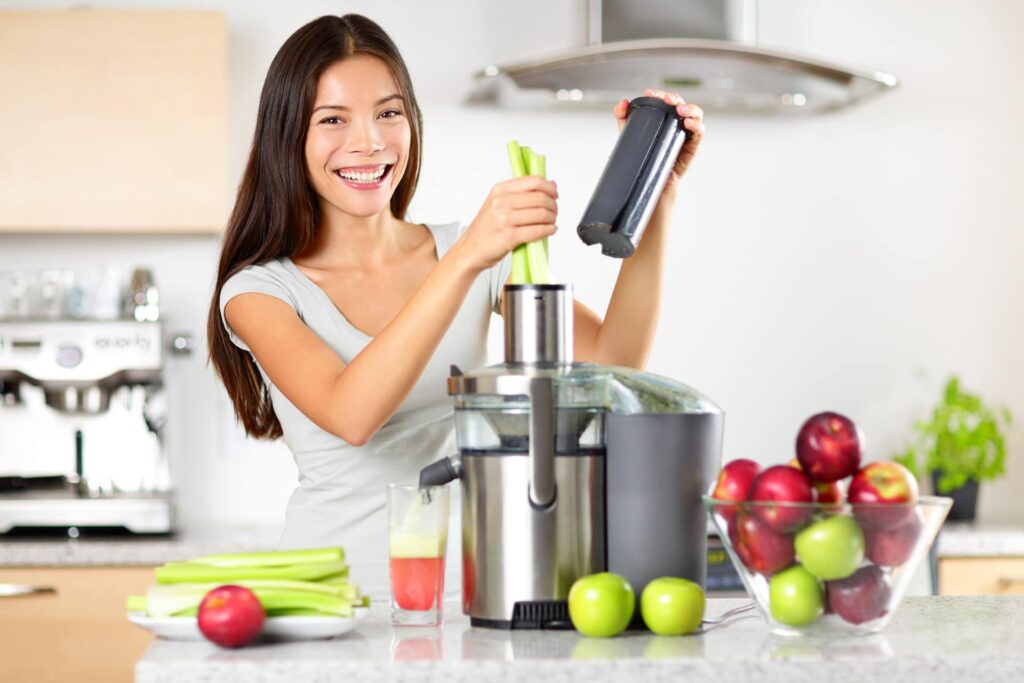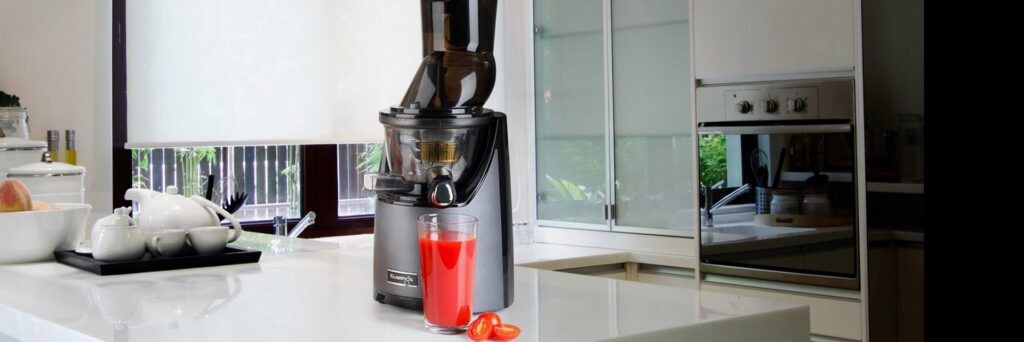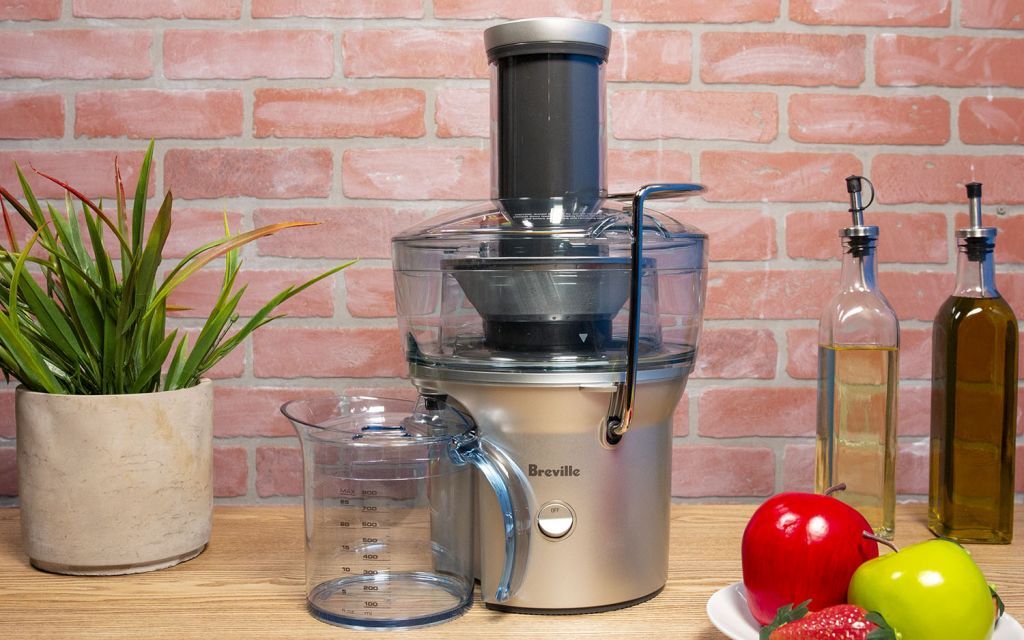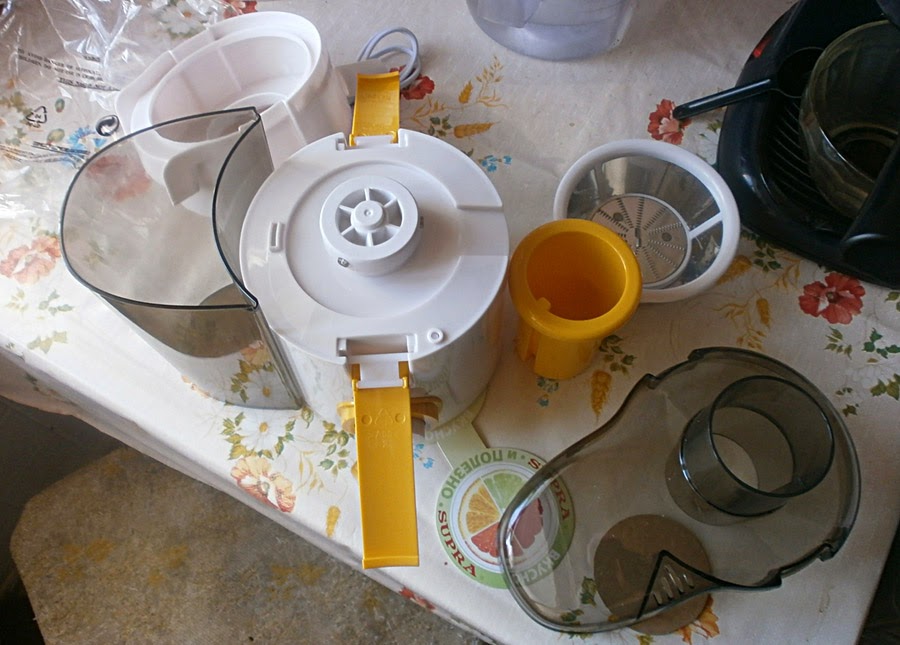If you are opening a juice bar, or simply want to enjoy fruit juices at home with your family and friends, a commercial juicer can be a great investment for your kitchen. The best commercial juicer is able to quickly turn out a high volume of juice compared to handheld and most household juicers, which means that you will never run low on juice.
We looked at centrifugal, masticating, and citrus juicers, which produce juices with very different qualities and work best with different fruits. In addition, we considered the motors and constructions – important for how much power you can get from your juicer and how durable it will be – of different juicers. At the end of this research, we came away with the top 6 commercial juicers to choose from for your kitchen. The Waring Commercial JC4000 came out to be our single best.
More features: 1-year warranty, dome included, vibration-dampening feet
This is a big strong powerful juicer for commercial use. With a 3/4 horsepower engine, this is a fast centrifugal juicer. It would be great for a restaurant, a hotel, or a caterer. A lot of people make tomatoes with this if they’re going to be canning tomato juice.
Being a fast juicer, it will get your juice ready in a few minutes, unlike a masticating juicer that takes up to 30 minutes to finish juicing. This is a powerful 3/4 HP centrifuge sign with a maximum speed level of around 1,800 rotations per minute. This device is approved by the UL and has a dome included. Because of their fast engine and high speed, centrifugal juicers are notorious for their high noise level. However, this device has feet that help dampen vibration.
The juicer is easier to clean than many more expensive models on the market. There are few parts to disassemble and clean and you can clean most of the parts in a dishwasher.
The heavy-duty juicing machine comes with a splash guard to help with splashes. It provides fast juice yield for commercial needs. We liked that the parts are removable and dishwasher safe.
More features: stainless steel construction, heavy duty motor, thermal cutout motor protector, up to 1 quart in 30 seconds, automatic pulp ejection, 6-month warranty
If you want to juice fast and reliably, then the Ruby 2000 centrifugal juicer is an excellent choice. The ¾ horsepower motor is not particularly powerful by the standards of competing juicers, but nevertheless, this model is capable of producing up to 1.5 liters of juice in just 30 seconds. The motor is also protected from overheating, which prolongs the life of the juicer.
The unit is constructed fully of stainless steel. Thanks to the easy-to-disassemble design, the juicer is extremely easy to clean. The large input tube allows you to juice large chunks of fruits and vegetables without much food preparation, which further speeds up the juicing process. Plus, the Ruby 2000 has an automatic pulp ejection feature to provide juice that is relatively smooth regardless of the toughness of the fruit you put into it. The main downside to this juicer is that it is best for juicy fruits and vegetables, since leafy greens and hard vegetables like carrots will not release much juice. However, if you are looking to juice these products, then take a look at the best juicers for leafy greens, as well as juicers for carrots.
Another thing to take into account is that this juicer comes with only a short six-month warranty, which is far less than for competing models and is rather short given the high price of the juicer.
More features: stainless steel motor base and ABS plastic, 5 qt. waste container
This juicer from Robot Coupe is extremely speedy at juicing a wide variety of fruits. The 1.25-horsepower motor is one of the most powerful among centrifugal juicers, but has a slightly lower blade speed than other juicers to enable more thorough extraction from tough fruits and vegetables. The motor does not have a built-in breaker to prevent overheating, although users did not note any issues with overheating after extended use.
The juicer is designed for speed with an automated feeder and extra-wide top opening to reduce the food preparation required. Plus, the unit comes with an automatic pulp separator and a massive 6.5-quart waste container to allow you to juice almost endlessly before having to empty out the container. The start and stop buttons are obvious, contributing to the ease of use of the juicer, and users greatly appreciated that the stainless steel lid was dishwasher safe for simple cleaning.
This juicer is relatively inexpensive compared to other centrifugal juicers, but only comes with a one-year warranty on the parts and motor. However, users found that the stainless steel and ABS plastic construction was durable and did not develop issues from frequent use in juicing bar businesses.
More features: stainless steel bowl and base, thermal circuit breaker, automatic pulp ejection, up to 1 quart in 1 minute, 2-year warranty on all components, 5-year motor warranty
This centrifugal juicer from Santos offers many of the same features as the Ruby 2000, but trades off slightly slower operation for longer warranty periods. The one horsepower motor is heavy duty, yet relatively quiet compared to other commercial juicers – which can be a major benefit for both home and business use. The motor is also equipped with overheating protection to keep it safe and comes with an extended five-year warranty to provide peace of mind on your investment. The remainder of the components are made of stainless steel and come with a two-year warranty, although users report that they last for many years of use.
However, although the juicer blade spins at 3,600 rpm, the unit outputs juice at a relatively moderate rate of one quart per minute. Despite this reduced juicing rate, the juicer has a large opening so you can move through juicing with little food preparation and comes with automatic pulp ejection to help keep your juice smooth.
Another nice design aspect of this juicer is the built-in safety features. The juicer is designed to turn off as soon as the top is unlocked, which ensures that the blade cannot accidentally be started while it is still exposed.
More features: stainless steel and BPA-free plastic; self-clean; versatile; 16 7/8 oz. capacity; 10-year motor warranty
If you don’t mind waiting for your juice, this masticating juicer from Hurom is an incredible bargain and produces high-quality juice. The motor is relatively small at only 150W, but since it is rotating at only 43 RPM it provides plenty of power to chew through even tough foods. Plus, the slow rotation and low-power motor make this juicer one of the quietest on the market. The motor comes with a 10-year warranty to guarantee your purchase.
The juicer is capable of producing a pint of juice in about 5–10 minutes depending on the fruits and vegetables you are working with. However, the motor can only run for about 30 minutes without overheating, which may severely limit how much juice you can make in each batch. Another downside, although most users didn’t seem to mind, was that the small 17 oz chamber capacity requires you to stay near the juicer to continuously feed more food into it.
The advantage to the extremely slow speed is that this juicer makes the most of your fruit, squeezing every last drop of juice out and leaving you with bone-dry pulp that is easily disposed of. Plus, the BPA-free plastic parts are removable and dishwasher-safe for easy cleaning.
More features: stainless steel and PC plastic; safety cut out switch
For those who need to juice citrus fruits for a lot of people, this citrus juicer from Superland is an excellent choice. At a price point that compares to most budget juicers, this citrus juicer is able to go through a whopping 30 oranges per minute to keep your pitcher full. In addition to oranges, the citrus juicer is suitable for grapefruits, lemons, and limes, and requires only minimal preparation – simply cut the citrus fruit in half and place it in the hopper.
There is no pulp removal included in this juicer, but since it relies on squeezing rather than a reamer much of the pulp should remain attached to the rinds. The discarded rinds are then automatically dumped into waste containers on either side of the machine to keep the area around the juicer clean. When you are finished, the component parts of the juicers are easily pulled apart for washing.
The primary downsides to this juicer are that, as far as we’re aware, it does not come with a warranty – which can make you think twice about making a big purchase for your business – and that at 98 pounds, it is difficult to use this juicer in your home or to move it out of the way when not in use.
Now that you’ve had a chance to look at our six favorite commercial juicers on the market, let’s take a closer look at some of the factors that should weigh in on your decision as to which juicer is the best for your needs.
Natural juice freshly squeezed from fruits is not only delicious but also healthy and nutritious. Unlike bottled fruit juices, freshly squeezed juices are free of preservatives and added sugars, which makes them an extremely popular choice among health enthusiasts. Plus, fruit juice is packed with vitamins and minerals that are a key part of a balanced diet.
At first glance, there is not much separating commercial juicers from their domestic counterparts. Commercial and household juicers perform much the same functions, and small commercial juicers can be about the same size as household juicers.
However, commercial juicers are far better equipped internally to handle larger juicing jobs on a more frequent basis. The internal parts of a commercial juicer, and particularly the parts that come in contact with acidic fruit juice, are reinforced to withstand significantly more juicing cycles and to be somewhat resistant to corrosion. The motor on commercial juicers is typically also more powerful, which can allow you to juice a greater number of fruits more rapidly. With that more powerful motor, commercial juicers also typically have protection from motor overheating, which is a major cause of breakdown for household juicers that are overused.
The determination of whether a commercial juicer is right for you largely depends on the amount of juice you plan to make and how frequently you plan to use the juicer. If you are opening a business that involves a juice bar, investing in a commercial juicer is a no-brainer. However, if you are considering a juicer at home, the decision may lie largely in whether you have a large family who all drink juice frequently or whether you plan to make juice only on occasion. If the latter case, a household juicer may be a budget- and space-saving option that will still meet your needs.
Not all juicers are made equally. In fact, there are three different types of commercial juicers – centrifugal, masticating, and citrus juicers.
Centrifugal juicers work much like a blender. They have a large blade that rotates at high speed to slice and dice fruits, allowing the juice to flow out. Masticating juicers are more efficient, since they grind food using an internal gear, or in some cases grind fruit between two gears. Citrus juicers are designed to work specifically with citrus fruits, like oranges, and function very differently than other fruit juicers. Citrus juicers have a mechanical reamer that spins into the fruit, removing the pulpy interior and releasing the juice.
Centrifugal and masticating juicers each have pros and cons. The problem with centrifugal juicers is that they are not particularly effective at squeezing juices out of fruit, and thus are somewhat prone to wasting food – it takes quite a large amount of fruit to make a single glass of juice. They also are ineffective if you’d like to make juice from leafy greens or wheatgrass. Masticating juicers, on the other hand, squeeze nearly every last bit of juice out of each piece of fruit and are much better for juicing hard fruits and vegetables such as carrots. However, masticating juicers are relatively slow and require a lot of food preparation, since they will clog and potentially break if you try to put large chunks into them. Centrifugal juicers take very little preparation, since they will slice through nearly anything and work extremely fast, but they can also be quite loud when operating.
Unfortunately, masticating juicers tend to cost two to three times more than their centrifugal counterparts. Citrus juicers are relatively cheap but are limited to citrus fruits and so do not necessarily leave you with a large number of options for making different types of juices.
The motor is one of the most important considerations after juicer type when purchasing a commercial juicer, since this is the heart of the juicer. A more powerful motor will allow you to juice larger chunks without clogging, which is especially important in the case of masticating juicers. However, the price of juicers tends to scale with the horsepower or wattage of the motor, so that the most powerful juicers can be extremely expensive.
More powerful motors will also tend to juice faster, although juicing speed depends primarily on the type of juicer you opt for – centrifugal juicers will always operate more quickly than masticating juicers. When comparing juicers of the same type, check the rotations per minute to gauge relative juicing speeds.
The other thing to consider is the amount of time for which a juicer can operate continuously without overheating. The longer the juicer can go, the more fruit you can juice before having to take a break to allow the appliance to cool down. Typically, juicers with more powerful motors and higher speeds will overheat more quickly.
Certification by one of the major Nationally Recognized Testing Laboratories can be a big deal for businesses purchasing a commercial juicer, where employee safety is paramount. Certifications by the Underwriters Laboratory (UL) or Intertek (ETL), for example, signify that the juicer has been rigorously tested and determined to meet safety standards as defined by the Occupational Safety and Health Administration.
A commercial juicer is a big investment and you’ll need to keep it clean, so durable stainless steel is the construction standard for many commercial juicers. However, there are juicers with BPA-free plastic components. When considering what build you need, consider both the price of the juicer and how many years you plan to use it for.
Also look for juicers with built-in safety features. The most common safety stopgap is an automatic shutoff if the juicer top is opened, to prevent the blades or gears from being exposed while in operation. In addition, overheating shutoffs can be important to the long-term life of the juicer so that you do not inadvertently burn out the motor.
A commercial juicer can be a significant investment for either your home or your business, so you want to know that you’re protected in case anything goes wrong. Warranties vary widely on commercial juicers, from none at all, to several months or a year, to up to 10 years on high-end juicers. Many commercial juicers also have longer warranties on the motors – the most critical component of the juicer, and also the part designed with durability most in mind – than on the rest of the juicer components. In general, the warranty on commercial juicers is shorter than on their household juicer counterparts.
Thanks to our detailed product reviews for the six best commercial juicers on the market today and our buying guide, finding the right commercial juicer for your home or business will be easy. A commercial juicer makes it possible to generate incredibly large volumes of fresh juice from a variety of fruits and vegetables for your home or business. If you drink a lot of juice, a juicer is a great way to reduce your cost at the grocery store and to ensure that you are not taking in any preservatives or added sugar with your juice. And if you have a café or restaurant, a juicer is a thing you just can’t do without. Aside from getting quality equipment, you should think about the ways in which more and more people can get to know about your place. The restaurant promotions offer online advertising ideas that are easy to follow and do really work. Check them out!






Which is the best: masticating or centrifugal juicer? Anybody had the experience using both types?
I’m using centrifugal juicer from Kitchenaid (not commercial grade) for oranges mainly.It works fantastic, no wasted fruits, everything what is left is completely dry after each use, so I guess it’s important to consider the manufacturer and customer reviews in order to find the best one
I personally use masticating juicer now and absolutely adore it! Thought it’s not commercial grade, it takes all the moisture out of a fruit and puts it all into your glass till the last drop, simply the best 🙂 I remember my parents owned a centrifugal one constantly complaining the food is just wasted with it…
I have the Robot Coupe one at home and it’s stunning. It’s been working flawlessly for around five years now, and though it’s costly for home use, I wouldn’t trade it for anything!
How silent is it? I make juice in the mornings, don’t want to disturb my kids
It’s a juicer, powerful as hell, so don’t expect it to be quiet. I usually use it when everybody’s up, and it doesn’t require too much time, just 30 secs-1 min to make 1-2 glasses 🙂
Yes, these are commercial grade, all of them, but actually I see no reason why any can’t be used at home apart from the price tag.